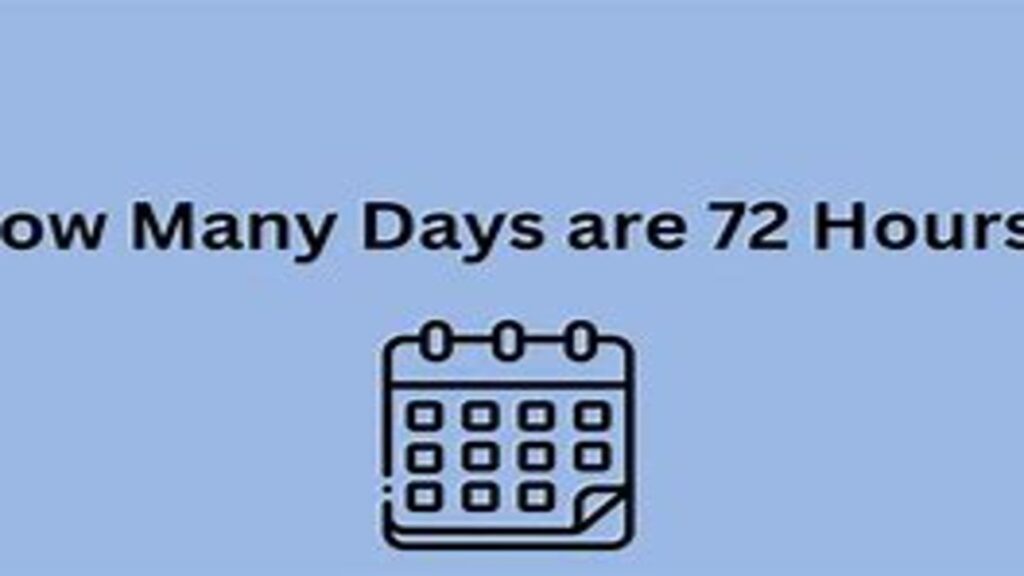Introduction
How Many Days Is 72 Hours. Ever stumbled upon a message that says something like “respond within 72 hours” or “your package will arrive in 72 hours”? If you’ve found yourself wondering, “How many days is that?”, you’re not alone. Understanding how time units like hours and days connect helps us manage schedules, meet deadlines, and make sense of time itself.
Let’s break it down in the easiest way possible and see how 72 hours fits into our daily lives.
The Quick Answer
To answer the question straight up:
72 hours = 3 days
That’s it. Divide 72 by 24 (the number of hours in a day), and you get exactly 3.
But let’s go a little deeper.
Breaking It Down
How Many Hours in a Day?
A standard day has 24 hours. This is based on Earth’s rotation—one full spin takes about 24 hours.
So to convert hours into days, you simply divide by 24. It’s a handy trick whether you’re calculating work hours, planning a trip, or trying to meet a deadline.
72 ÷ 24 = 3
So, 72 hours equals exactly 3 full days.
Real-Life Examples of 72 Hours
Emergency Situations
In emergency preparedness, you’ll often hear about the “72-hour kit.” Why? Because 3 days is considered a critical survival window during disasters before help typically arrives.
Deadlines and Work Tasks
You might get 72 hours to submit a report or reply to an important email. That’s 3 days—not a second more!
Travel and Jet Lag Recovery
After long international flights, many people feel back to normal after about 72 hours of rest. Three days can reset your internal clock.
What Can You Do in 72 Hours?
It might not sound like much, but three days is more powerful than you think.
Productivity Goals
Want to finish a book, launch a small project, or start a mini fitness challenge? You can make serious progress in 72 hours if you plan it right.
Rest and Recovery
Burnt out? Use a 3-day weekend to unplug, relax, and recharge.
Planning a Weekend Trip
A Friday night to Monday morning trip fits right into a 72-hour window—perfect for spontaneous adventures.
Time Management Tips for 72-Hour Periods
When you’ve got a fixed block of time like 72 hours, every minute counts.
Prioritize Tasks
Start with what matters most. Knock out high-priority goals early so you’re not scrambling at the end.
Use Time Blocks
Divide your day into chunks—maybe 3-hour or 6-hour blocks. Assign tasks or breaks to each block.
Avoid Burnout
Don’t go full throttle for all 72 hours. Schedule breaks, sleep, and even moments of boredom (yes, that helps creativity!).
Understanding Time Perception
Why 72 Hours Can Feel Long or Short
Time is weird. Three days on vacation might fly by. But three days waiting for test results? Agonizing. Our perception of time is shaped by emotions, stress levels, and activity.
Mental and Emotional Impact
Long stretches of time can feel stressful if you’re anxious. But with the right mindset, 72 hours can be empowering. It’s a chance to reset, push boundaries, or get things done.
Fun Facts About Time
- Did you know? A fruit fly lives about 72 hours—its entire life is just three human days!
- In some cultures, like in traditional Japanese timekeeping, the day was divided into 12 unequal hours, which changed with the seasons!
- In ancient Rome, time was measured using sundials—on cloudy days, timekeeping simply paused.
Conclusion
So, the next time someone mentions “72 hours,” you’ll know it means 3 full days. Whether it’s for meeting a deadline, preparing for an event, or just organizing your life, knowing how hours convert to days makes everything a little easier.
Time is one of our most valuable resources. Use it wisely—and you’ll be amazed at what you can do in just 72 hours.
FAQs
1. Is 72 hours the same as 3 full days?
Yes, 72 hours is exactly 3 full 24-hour days.
2. Can you survive without sleep for 72 hours?
It’s possible, but dangerous. After about 72 hours without sleep, cognitive functions deteriorate, hallucinations can occur, and the immune system weakens. Not recommended!
3. How do I track 72 hours efficiently?
Use apps, phone timers, or even sticky notes. Start a countdown or create a checklist for each day.
4. What happens if a deadline says “within 72 hours”?
It means you need to complete the task before 72 hours have passed—not after. Track it carefully from the moment you’re notified.
5. Why is 72 hours used in emergencies?
It’s considered a practical time frame in which people may need to be self-sufficient after a disaster, before emergency help becomes available.







